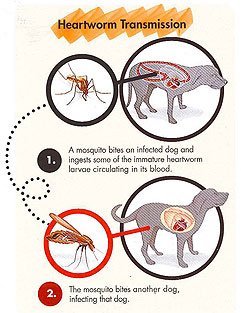FAQ
APPOINTMENTDo you have questions?
Our team has answers! Find answers to our most frequently asked questions below. If you don’t see what you’re looking for, please don’t hesitate to contact us directly at 734-728-2520.
When should I spay or neuter my pet? Why should I spay or neuter?
You can have your pet spayed or neutered as early as 6 months of age. Spaying and neutering your pet benefits both you and your pet. Pets that have been spayed or neutered no longer have the urge to roam and look for a mate, and as a result, it limits their chances of being involved in a traumatic accident, such as being hit by a car.
Most importantly, spaying and neutering your pet early in life protects them from various cancers. Spaying a female dog or cat eliminates the possibility of uterine or ovarian cancer and greatly reduces the incidence of breast cancer. Neutering male dogs and cats reduces the incidence of prostate cancer.
What is heartworm disease?
How are heartworms transmitted?
Heartworm is transmitted by mosquito bites. The steps are as follows:
1. A mosquito bites an animal that is currently carrying adult and larval heartworms.
2. The larval form is carried by the mosquito, which is called microfilariae.
3. When the mosquito bites another dog or cat, that animal is now infected with the heartworm microfilariae.
4. Within 70 to 90 days, the microfilariae have made it through the tissues to the animal’s heart, where they mature and reproduce (providing both male and female worms are present) and live for several years. If both sexes of worms are present, they will be producing their own microfilariae within 6-7 months after that mosquito bite.
5. The cycle continues.

How can I prevent my pet from getting heartworms?
What is a mircochip and how does it work?
Losing a pet can be heartbreaking, and an unsuccessful search even more. Over the past few decades, a new method has been developed in helping us keep track of our pets: microchipping. Microchipping is nothing more than your pet receiving another annual vaccine. A microchip is administered through a needle and is implanted in the flap of skin in the neck of your pet. The chip itself is a tiny capsule about the size of a grain of rice. The chip holds a number that is unique to your pet. The chip remains inactive until it is scanned, and today just about every vet and animal control center is equipped with these scanners. Once a chip has been identified, professional personnel will ensure the safe return of your pet.
Microchipping is nothing more than your pet receiving another annual vaccine.
What is feline leukemia?
What are the symptoms and how can I be sure that my cat isn't infected?
Today the best way to determine if your cat is infected with feline leukemia is through a blood test. This blood test can typically be run in your veterinarian’s office, and you can usually have the results in about 15 minutes.
Can feline leukemia be treated?
NO. Currently, there is no cure for an infected cat. If you have an infected cat, it is not recommended that you bring another cat into the household. It’s also important to make sure infected cats are not let outdoors where they could potentially spread the disease.
What is pre-anesthetic bloodwork, and is it necessary?
At Griffith Veterinary Hospital, your pets are family.
We're pleased to be your Westland, MI veterinarian of choice. Our compassionate team strives to provide the best care possible for your beloved furry friends. We look forward to seeing you soon!
Contact Griffith Veterinary Hospital
Our team is here to help. Please don’t hesitate to reach out with questions!
Location
36391 Ford Rd.
Westland, MI 48185
Phone
Hours
Monday – Friday:
8:00 AM – 6:00 PM
Have a question?
Our team is here to help! Fill out the form below and we'll be in touch with you shortly.

